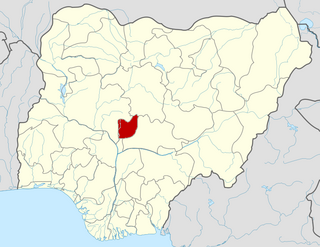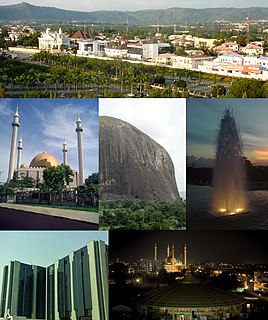A federal district is a type of administrative division of a federation, usually under the direct control of a federal government and organized sometimes with a single municipal body. Federal districts often include capital districts, and they exist in various countries worldwide.

The Federal Capital Territory, is a federal territory in central Nigeria. Abuja, the capital city of Nigeria, is located in this territory. FCT was formed in 1976 from parts of the states of Nasarawa, Niger and Kogi. It is within the Middle Belt region of the country. Unlike the States of Nigeria, which are headed by elected Governors, it is administered by the Federal Capital Territory Administration, headed by a minister appointed by the President.

Aso Villa is the workplace and official residence of the President of Nigeria since 1992, when Nigeria moved its capital from Lagos to Abuja. It is located at Yakubu Gowon Crescent, The Three Arms Zone, Asokoro, Abuja, FCT, Nigeria. Several names that are used for Aso Villa include: State House, The Rock and The Villa. The Aso Rock villa is the most protected presidential state house in Africa.
Aliyu Modibbo Umar is a Nigerian technocrat who was the federal Minister of State for Power and Steel from December 2002 to May 2003, Minister of Commerce from July 2006 to July 2007, then Minister for the FCT, a post he held until October 2008.

The Abuja National Mosque, also known as the Nigerian National Mosque, is the national mosque of Nigeria, a country with a substantial Muslim population. The mosque was built in 1984 and is open to the non-Muslim public, except during congregational prayers. Ustadz Musa Mohammed is the chief imam.
Gwagwalada is an area council in the Federal Capital Territory in Nigeria. Gwagwalada is also the name of the main city in the Local Government Area, which has an area of 1,043 km2 and a population of 157,770 at the 2006 census.

Adamu Muhammad Sidi-Ali is a Nigerian politician and farmer. He has run successfully for the offices of Chairman and for the House of Representatives beginning in the early 2000s. In December 2014, he emerged again as the Senatorial Candidate of the All Progressives Congress for the 2015 elections. He is a native of Abaji Area Council in the Federal Capital Territory.
Karu is a Local Government Area in Nasarawa State, central Nigeria.It is close in proximity to the Federal Capital Territory of Nigeria. It has an area of 2,640 km².Karu local government has its headquarters in New Karu town. It was originally built to house the capital's civil servants and lower income families, but had no running water or good sanitation system.
Abaji is an area council in the Federal Capital Territory in Nigeria. The city is the land of the Egbira, Ganagana and Hausa people, the majority are Egbira and Ganagana, the first settlement in Abuja are Egbira and Tiv people before the coming of Usman Danfodio religious war to North central, Abuja South, after the kinship throne won by Egbira people that win war between them and Tiv people, they become ruling kinship and Allow the Hausa as Imam of the city the name use to be Igabaji, and is one of the area council in Abuja. The land is headed by the Ona of Abuja. The land was under the old Koton Karfe kingdom but agreed to join the federal capital territory for developmental purpose.
The Federal Capital Territory Administration (FCTA) is a Nigerian ministry that administers the Federal Capital Territory of Nigeria. It is headed by a Minister appointed by the President, assisted by a Permanent Secretary, who is a career civil servant. Presently, the FCT Minister is Mohammed Bello, assisted by Permanent Secretary Mr. Ohaa Chinyeaka Christian.
Air Vice Marshal (retired) Hamza Abdullahi was Governor of Kano State in Nigeria from January 1984 to August 1985 during the military regime of General Muhammadu Buhari. After General Ibrahim Babangida took power, he was appointed Minister of Works and Housing, and later Minister of the Federal Capital Territory.
The table below lists Nigerian Senators of the 6th National Assembly. The 6th National Assembly was inaugurated on 5 June 2007. The Senate includes three senators from each of the 36 states, plus one minister for the Federal Capital Territory, Abuja. Of the 109 Senators, 26 were re-elected while 83 were elected for the first time. David Mark was appointed president of the Senate and Ike Ekweremadu deputy president.
Abubakar Danso Sodangi was elected Senator for the Nasarawa West constituency of Nasarawa State, Nigeria, taking office in May 1999, and was reelected in 2003 and 2007. He is a member of the People's Democratic Party (PDP).

The Suleja Emirate is a Hausa principality in what is now Niger State, Nigeria. The emirate was established as the Abuja Emirate during the 19th century, located just north of the site of the present-day federal capital city named Abuja. When the new city was established, the emirate and its capital were renamed the Suleja Emirate and Suleja. The emirate covers about 1,150 square miles of wooded savanna area.
Philips Tanimu Aduda is a Nigerian politician who served two terms in the national House of Representatives between 2003 and 2011, and was elected to the Senate for the Abuja Federal Capital Territory in the 9 April 2011 elections, running on the People's Democratic Party (PDP) ticket.
Yusuf Datti Baba-Ahmed is a Nigerian economist and politician. He is the Pro-chancellor of Baze University.

Abuja Investments Company Limited (AICL) is a leading business development and investment holding company for the Federal Capital Territory Administration (FCTA), based in the Capital City - Abuja, Nigeria.

The Nigerian courts of appeals are the intermediate appellate courts of the Nigerian federal court system. The court of appeals decides appeals from the district courts within the federal judicial system, and in some instances from other designated federal courts and administrative agencies. As at 2010, there are 66 judges of the Nigerian courts of appeals authorized by the Senate. These judges are recommended by the National Judicial Council, nominated by the President of Nigeria and confirmed by the Senate. There are currently seventy-two Nigerian courts of appeals across the six geopolitical zones of Nigeria. There are 12 North-Central, 10 in Northeast, 10 in Northwest, 10 in South-south, 9 in Southeast and 11 in Southwestern Nigeria. The headquarter is located at Three Arms Zone, Abuja.

The National Assembly Complex is the legislative building of the National Assembly, the legislative body for Federal Republic of Nigeria. It was built in 1999 at a cost of nearly $35.18 million and the contract was awarded to ITB Nigeria, on February 18, 1996 through the Department of public building, FCDA, Abuja.









